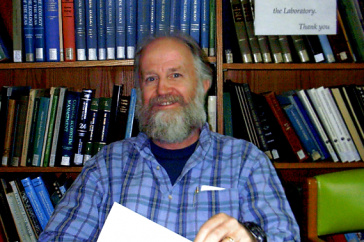NH Space Grant Consortium Celebrates 20 Years on June 2, Astronaut to Speak

Fred Short, professor of natural resources and the environment at the University of New Hampshire and a leading expert in seagrass conservation and restoration worldwide, has received the Lifetime Achievement Environmental Merit Award from the Environmental Protection Agency (EPA) New England region.
DURHAM, N.H. -- With a proclamation from Governor John Lynch declaring Thursday June 2, 2011, as New Hampshire Space Grant Day, members of the New Hampshire Space Grant Consortium (NHSGC) and officials from the University of New Hampshire and the National Aeronautics and Space Administration - including keynote speaker former NASA astronaut Jeff Hoffman - will celebrate the consortium's 20 years of work dedicated to improving education and public awareness of science, technology, engineering, and mathematics, particularly as related to our nation's space program.
The celebration will occur at the Institute for the Study of Earth, Oceans, and Space (EOS) in Morse Hall on the Durham campus from noon to 3 p.m. Members of the general public are invited to participate.
In addition to astronaut Hoffman's presentation, "The Future of Human Spaceflight," there will be exhibits and demonstrations centered on the consortium's core themes and will include student-built robotics, rocketry and satellites; research posters; solar observing; and a 3-D movie entitled "Earth's Wild Ride" shown in an inflatable planetarium. There will also be tours of EOS facilities, including the Space Science Center's machine shop where UNH-built instruments for NASA science missions are fabricated, and the Geospatial Information Systems and Remote Sensing Lab.
For the past 20 years the NHSGC has successfully applied for and received annual funding awards from NASA, last year receiving $875,000. The federal grant, which is administered through UNH, is distributed across the state through the consortium affiliates. These include institutes of higher education - UNH, Dartmouth College, Plymouth State University, and the Community College System of New Hampshire; informal education partners - the McAuliffe-Shepard Discovery Center, the Mount Washington Observatory, the Rey Center and Curious George Cottage, and FIRST Place; and industrial partner BAE Systems of North America. There are Space Grant consortia in all 50 states, the District of Columbia and Puerto Rico.
Since its founding in 1991, the NHSGC has been under the directorship of research professor David Bartlett, associate director of the UNH Institute for the Study of Earth, Oceans, and Space.
Says Bartlett, "The hallmark of the program has been our support for New Hampshire students studying science and technology, but we are also pleased to be involving a cross-section of state institutions and citizens through partners such as the McAuliffe Shepard Discovery Center, the Rey Center, BAE Systems, and the Mount Washington Observatory."
The consortium involves thousands of teachers, students, faculty, and citizens around the state interested in the sciences, in space science, and in inspiring future scientists. The NHSGC has awarded more than 1,000 students in higher education more than $6.5 million in scholarships to help them pursue studies of science, technology, engineering, mathematics, and science education.
Among its activities, the consortium sponsors a host of projects that give a wide range of students the opportunity to do real research alongside scientists and teachers. For example, Forest Watch, which also began in 1991, partners UNH scientists with middle/high school students from across New England who collect and process data relating to air pollution damage in stands of white pine trees near their schools. Since its inception more than 350 schools have participated in the program.
With the support of the NHSGC, New Hampshire undergraduate and graduate students have also taken new courses based on NASA's newest science, built satellites and tested attitude control scenarios, and improved weather forecasting for the Kennedy Space center/Cape Canaveral Air Force Station. Hundreds of thousands younger students throughout the state have used NASA resources in their classroom.
Keynote speaker Jeff Hoffman is the current director of the Massachusetts Space Grant Consortium and a professor of the Practice of Aerospace Engineering in the Department of Aeronautics and Astronautics at the Massachusetts Institute of Technology. As a NASA Space Shuttle astronaut he made five flights and performed four spacewalks, including the first unplanned, contingency spacewalk in NASA's history and the initial repair/rescue mission for the Hubble Space Telescope.
For further details, directions, and parking information visit http://www.nhsgc.sr.unh.edu/20years.html.
The University of New Hampshire, founded in 1866, is a world-class public research university with the feel of a New England liberal arts college. A land, sea, and space-grant university, UNH is the state's flagship public institution, enrolling 12,200 undergraduate and 2,300 graduate students.
-30-
A photograph of former NASA astronaut Jeff Hoffman can be downloaded at http://www.eos.unh.edu/newsimage/JAH_lg.jpeg. Photo courtesy of NASA.
Latest News
-
July 2, 2024
-
June 18, 2024
-
June 18, 2024
-
May 17, 2024
-
May 14, 2024

















































